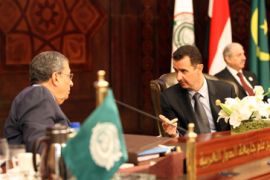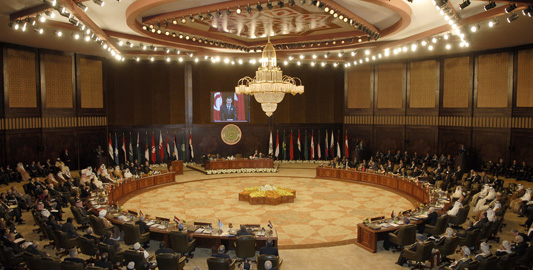Analysis: Syria’s difficult road
Following a partial boycott at the Arab Summit, Damascus must now walk a tight rope.

 |
| Syria must now try to bridge the differences which came to the fore at the Arab Summit last week [AFP] |
For the Syrian hosts, last week’s Arab Summit in Damascus was a success.
Despite a partial boycott and attempts to scuttle the conference, which was designed to bring together the 22 nations of the Arab League, the Syrians remained defiant and went ahead as scheduled.
However, the end of the 20th Arab Summit marks the beginning of Syria’s year-long tenure at the Arab League presidency.
Syria cannot afford to be confrontational given its awkward position on key regional issues such as Lebanon, Iraq and the Palestinian factional divisions.
It is these that have divided the Arab nation as never before.
Bashar Assad, the Syrian president, is keen to avoid further deepening the existing rift in the Arab ranks.
This was evident in his opening address to the summit, in which he steered clear from naming and shaming those who boycotted his summit or sent low level representation.
Blaming the US
He did, however, acknowledge those that tried to foil it – namely, the US.
The US exerted utmost pressure to get as many of its allies as possible to boycott the proceedings.
And they succeeded. Lebanon did not turn up at all, whereas the two key players, Egypt and Saudi Arabia, managed to send only low-level officials.
Many of the remaining 22 Arab League member states followed suit. Only half of the Arab leaders were present. Jordan replaced its foreign minister with a low ranking official, after the former attended the plenary meetings in Damascus.
The Syrians now have to walk a tight rope. It will be up to them in the next 12 months to mediate and moderate between their Arab brethern over the many thorny issues in the area, predominantly Lebanon, where many believe the Syrians are party to the dispute.
Absent solutions
Behind closed doors, the Arab leaders avoided discussing Lebanon.
“We cannot discuss the affairs of an absent member,” said Waleed Mouallem, the Syrian foreign minister, in a joint press conference with Amr Moussa, the Arab League secretary-general, at the close of the summit.
It was also Mouallem who dismissed a question on the coincidental timing of a visit to the region by Condoleeza Rice, the US secretary of state.
“Forget the Americans,” Mouallem said of Rice’s 12th visit to the Middle East.
While the Damascus Declaration, the final communique issued by the summit, called on all “divided” Arabs to unite and close their ranks, it did not offer any solutions on how to achieve this rapprochement.
Though it may be seen as a success, the summit did not resolve the Lebanese presidential crisis or advise the Palestinians on how to iron out their divisions.
It also failed to demand a US withdrawal from Iraq or end the Israeli occupation of the Palestinian territories.